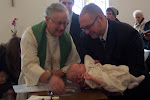THE
LAZARUS/JUDAS CONNECTION
Firstly,
please understand that this is an off-the-wall hypothesis, with no intention to
challenge or harm anyone’s faith. Nor do
I believe that it is in any way disrespectful to the authority of Scripture. I believe that the Bible is quite dynamic and
constantly revealing. It is indeed
appropriate for us to ask the far out questions and allow the Bible to speak to
us afresh today. As long as there are
unanswered questions, then we must keep asking and searching. Such is one point about why I engage in such
speculation.
I have
long been intrigued by the story of the raising of Lazarus (John 11:1-53). It is surrounded by so many unanswered
questions: Who was Lazarus? Why is this
story only told in the Gospel of John?
Is Jesus’ parable about the rich man and Lazarus (told only in Luke
16:19-31) about the same person?
Whatever happened to Lazarus? If
the Gospel of John is the first of the gospels written (as I suppose), did the
other gospel writers deliberately exclude the story of Jesus’ miraculous and
revelatory resuscitation of Lazarus?
And, if so, why?
My
hypothesis is that the raising of Lazarus became such a point of embarrassment
in the early Christian Church that Mark and Matthew, writing gospels for the
convincing and converting of Jews and Gentiles to Christianity, deliberately
chose not to include this event from Jesus’ ministry. It was difficult to explain why Jesus would
chose to delay his visit to the ailing Lazarus (John 11:6) when he loved him so
much. It is difficult to explain why
Jesus would raise someone from the dead, only for that person to die
again. The point is too difficult to
explain in an evangelical treatise. Luke,
on the other hand, specifically tells us that he is making a scholarly attempt
at reconciling all the evidence about Jesus (Luke 1:1-4). How then can Luke ignore the raising of
Lazarus? Still being sensitive to the
embarrassing nature of the incident, Luke includes Lazarus in the form of a
parable told by Jesus about the great chasm between heaven and earth.
How
much more embarrassing does the raising of Lazarus appear if the person raised
from the dead by someone who loves him so much becomes the person who later
turns Jesus over to the Jewish authorities, leading to Jesus’ crucifixion!
How did
I ever get there?
All the
Biblical evidence supports the existence of a family unit in Bethany of two
sisters and a brother: Mary, Martha and Lazarus ( John 11:1-3). But when Luke tells the famous story about
Mary and Martha (Luke 10:38-42) there is no mention at all of Lazarus. Lazarus has again been expunged from the
story.
Later
in Chapter 12:1-11, Jesus again comes to Bethany, to the home of Mary, Martha,
and Lazarus, where Mary anoints Jesus and wipes his feet with her hair. Judas Iscariot, who seems to be a distinctly
different person, objects at the apparent wastefulness. He seems to be a corrupt Treasurer (John
12:6). Is this the same Mary and the
same story as Matthew 26:6-13? We are
told here that this anointing takes place in Bethany at the home of Simon the
leper. Is Simon the father of Mary,
Martha and Lazarus? How interesting that
immediately following this we are told about Judas’ contract to betray Jesus!
Now go
to John 13. This is John’s version of
the Last Supper. Notice in verse 2 and
verse 26 how Judas is referred to as: “Judas Iscariot, Simon’s son,” or “Judas,
the son of Simon Iscariot.” Is this the
same Simon the leper who seems to be the father of Mary, Martha, and Lazarus?
The
table seating is a bit curious at John’s version of the Last Supper. By the table conversation and actions that
take place it is apparent that John, the disciple whom Jesus loved, is on one
side of Jesus (13:23) and that Judas is on the other (13:26). The place on the right hand of Jesus would be
a place of honor for the disciple whom Jesus loved, while the place on the left
hand of Jesus would be for the host. Is
Judas the host? i.e. this last supper is taking place in the home of Judas, the
son of Simon? It is interesting to read
in Psalm 41:9 this prophetic word: “Even my bosom friend in whom I trusted, who
ate of my bread, has lifted his heel against me.” The term “bosom friend” may not be one we
associate with Judas, but it most certainly is one we would identify with Lazarus
(John 11: 3, 5, 36).
Finally,
what about the name, Lazarus? I propose
that “Lazarus” was something of a nickname that Judas, son of Simon, and
brother of Mary and Martha, received at his raising from the dead. Only John retains that nickname stemming from
that event. It is derived from 11:43
when Jesus commands the exit of the dead from the tomb. Lazarus is the Greek version of the Hebrew
name/word, Eliezar, meaning, “God is my helper.” Rather than a calling out by name, this could
be something of an invocation preceding the miraculous event. Roughly translated it would be: “As God is my
helper, come out!” See Psalm 54:4 as an
example of such an invocation. And from
then on, Judas is known as Lazarus; at least until Judas betrays the one who raised
him from the dead.
I
wonder if the parable of the rich man and Lazarus in Luke - where the rich man,
“Divas,” is in eternal torment and “Lazarus” rests in the bosom of Abraham - is
meant to represent the two natures of Judas.
That,
in a nutshell, is my theory. It’s meant
to be as curious, interesting, and something to make you go, “Humm!”
